 She meant to cause them sorrow, she meant to cause them pain. 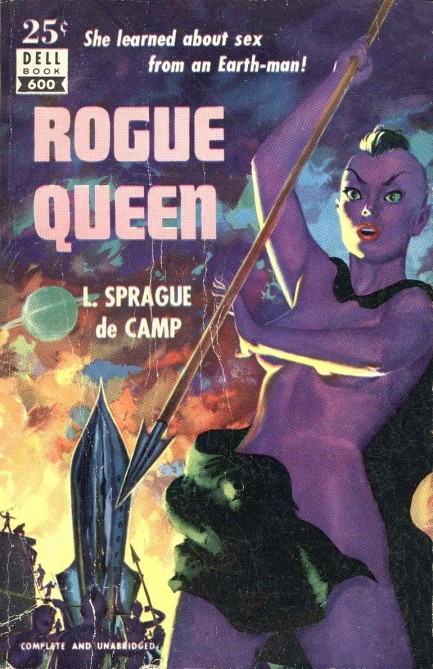
We just explored Mike Ludlow's pin-up work recently and here he is in paperback mode with a cover for L. Sprague de Camp's Rogue Queen, the third book in the Interplanetarias series, with this one coming in 1951 originally, followed in ’53 by the Dell paperback edition. The text on the cover is misleading. “She learned about sex from an Earth man”? Well, not really. What actually happens is humans land on a distant planet where the humanoid inhabitants have hive-like social structures, with queens, drones, and workers. One of the workers who's a sort of liaison assigned to the humans does learn about sex, but only in conversation as she seeks to compare human sexuality with that of her own species. There's no interspecies freakiness, and it's barely even hinted at. There was really no need for Dell to try to trick readers—the book is decent all on its own as de Camp explores the geopolitical relationships between different hives, and their efforts to trick the humans into supporting one side or another in an ongoing war. Many of these books from the golden age of science fiction are high concept, dramatic but not overbearingly serious, and about at the right emotional level for a high school freshman. Rogue Queen fits the bill in all respects. 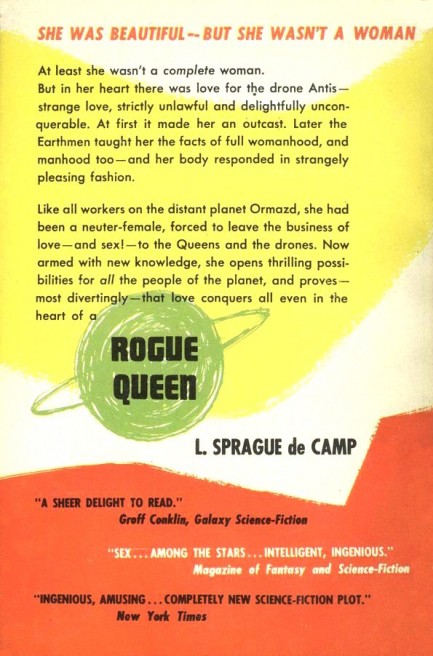
 Gestapo goes to extraordinary lengths to cancel a Czech. 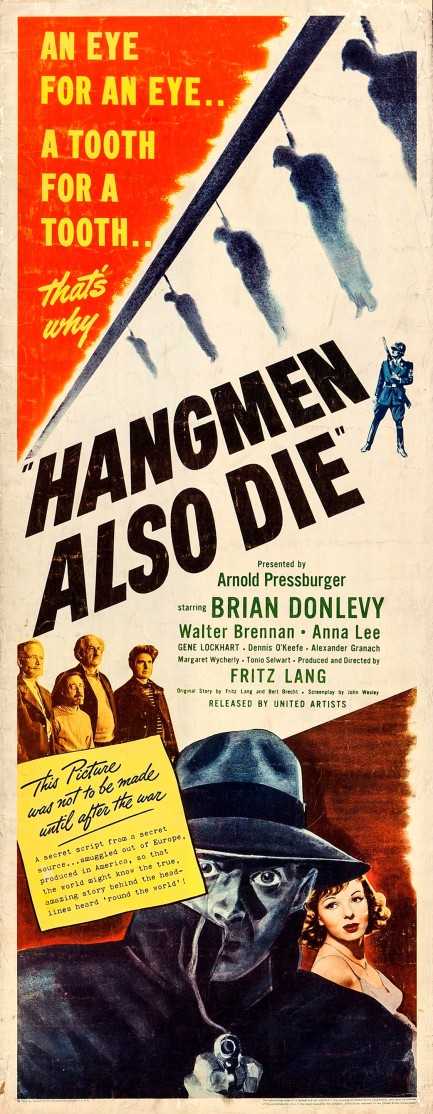
This striking poster for Hangmen Also Die might make you think you're dealing with a death row film noir, but it's actually a war drama about the Nazi occupation of Czechoslovakia. When a Czech assassin played by Brian Donlevy shoots the country's cruel German administrator Reinhard Heydrich and escapes into Prague's urban maze, the Nazis start executing people to force the population to turn over the shooter. As people die Donlevy struggles over whether to turn himself in. This was made in 1943 and qualifies as war propaganda, complete with flourishes such as discordant brass when Hitler's portrait appears onscreen, and a cheeseball closing song with a chorus of, “No surrender!” And to just bang the war drum even more, the movie premiered in, of all places, Prague, Oklahoma today in 1943, and the showing featured hanged effigies of Hitler, Hirohito, and Mussolini, while regional politicians made a point of attending. That must have been some night.
But while Hangmen Also Die may qualify as propaganda, it certainly isn't untrue in any major sense. The film's two architects, German director Fritz Lang and German writer Bertolt Brecht, both left their homeland to avoid the Nazis, and we can only imagine that their personal experiences made this project deeply important to them. But even people working from personal experience need help, and they get a major boost from co-star Walter Brennan. You'll sometimes read about him being a great character actor and this movie proves it. Watch him in this, then as the drunkard Eddie in To Have and Have Not, and you'll find him physically unrecognizable. Only his distinctive voice identifies him as the same person. Meanwhile it's Donlevy who's asked to personify the classic moral dilemma of sacrifice for the greater good, and he's mostly successful at portraying it as a heavy burden. While we wouldn't call Hangmen Also Die a great movie, there's no doubt it occupies its niche comfortably.  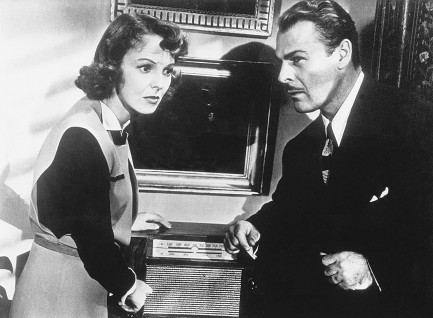 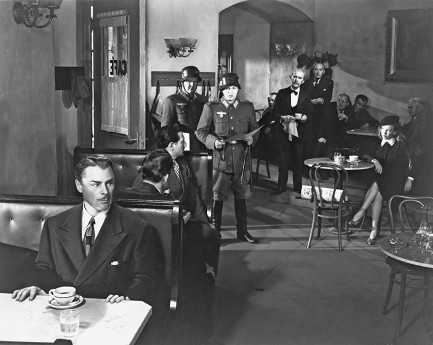  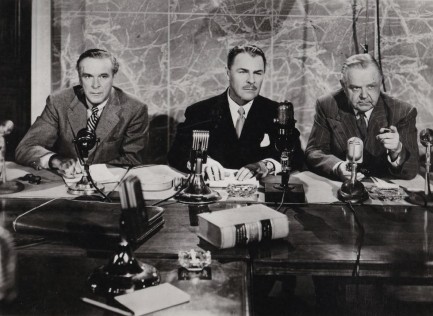 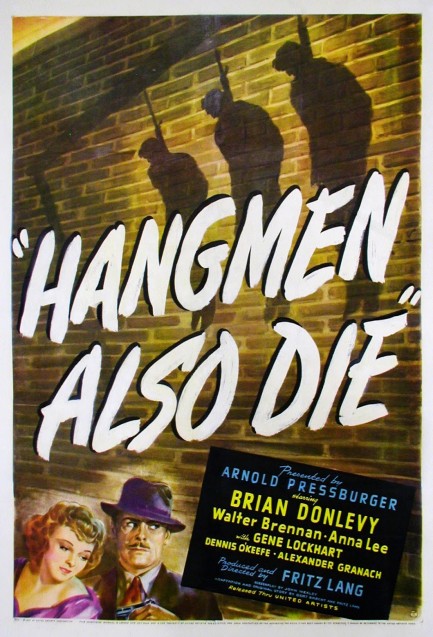
 Why bother to become a real expert when fake expertise is so much easier? 
There’s no limit to the range of tabloids from the 1960s and 1970s. Yesterday we showed you Private Affairs, and today we’re going downmarket with Offbeat, which came from Beta Publications of Chicago. The main thing that’s offbeat with this publication is the cover design, which you can see on this issue that appeared today in 1965 features elements skewed relative to each other and the magazine’s frame. We like it. Content-wise, though, Offbeat is nothing new. Its report on the shocking habits of American housewives is just sleaze fiction dressed up as research. 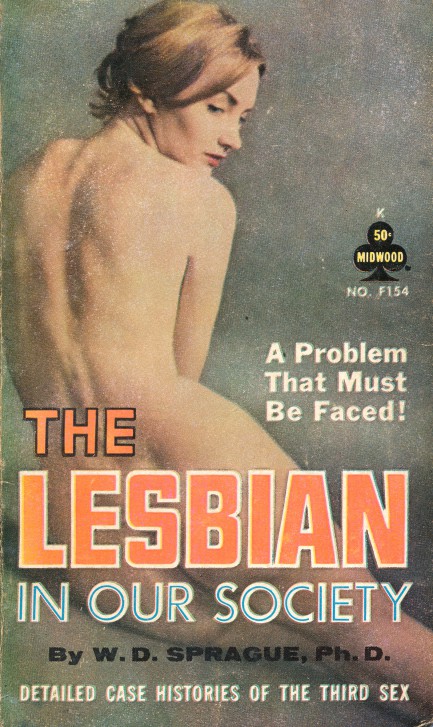 The number one reason wives cheat, according to W.D. Sprague, PhD, is revenge against cheating husbands. Readers are treated to a steamy retelling of a wife’s affair with a milkman—yes, really, a milkman—and another wife tells the story of how she ran into an old boyfriend one day and they fell into the old pattern and started having sex regularly again. It’s pure lit-porn. The number one reason wives cheat, according to W.D. Sprague, PhD, is revenge against cheating husbands. Readers are treated to a steamy retelling of a wife’s affair with a milkman—yes, really, a milkman—and another wife tells the story of how she ran into an old boyfriend one day and they fell into the old pattern and started having sex regularly again. It’s pure lit-porn.
W.D. Sprague was not the creation of tabloid editors you might suspect, but rather an actual author who published Sexual Behavior of American Nurses, Sex and the Secretary, The Lesbian in Our Society (A Problem That Must Be Faced!), and many other romps that swelled readers’ groins while doing the same for his bank account. The article in Offbeat is actually taken directly from Sexual Behavior of the American Housewife, another Sprague winner. His real name was Bela von Block—yes, really—and he also published under other names besides Sprague. His PhD was a hoax, of course, but who needs a degree when you’re smart enough to make a career of faking expertise about the inner lives of women? Some of his work was done for reliable sleaze imprint Midwood-Tower, but he also published for Lancer and other companies. We’ll undoubtedly run across him at some point in the future.

 Good day sunshine. 
Above, a promo photo of British actress Elizabeth Allan, who made more than fifty films, including the 1932 thriller The Lodger, Tod Browning’s Mark of the Vampire, aka Vampires of Prague, and 1936’s Camille, with Greta Garbo. This summery shot dates from 1933.
 The first cut is the deepest.
We haven’t explored the sword and sorcery aspects of pulp very much yet, so we thought we’d show you the below Frank Frazetta painting used for the covers of a 70s metal album and a Spanish language Conan book. We doubt Frazetta’s piece, titled Ice Giants, is hanging in a museum somewhere, but it should be. For the life of us we can’t see how a Pollack or a Lichtenstein is any better. But maybe we’re just crazy.
 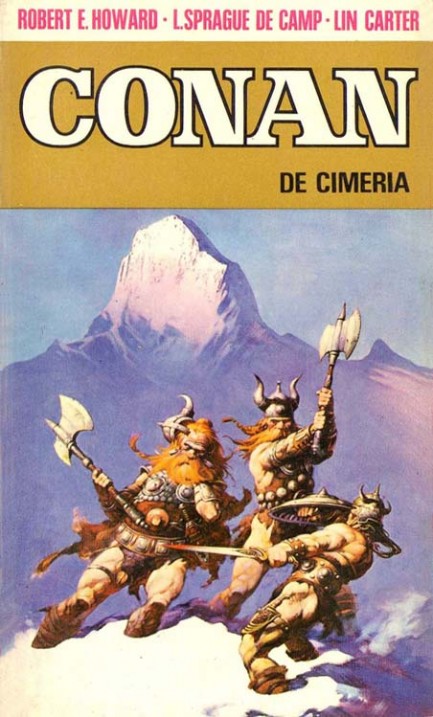
|
 |

The headlines that mattered yesteryear.
1927—Mae West Sentenced to Jail
American actress and playwright Mae West is sentenced to ten days in jail for obscenity for the content of her play Sex. The trial occurred even though the play had run for a year and had been seen by 325,000 people. However West's considerable popularity, already based on her risque image, only increased due to the controversy. 1971—Manson Sentenced to Death
In the U.S, cult leader Charles Manson is sentenced to death for inciting the murders of Sharon Tate and several other people. Three accomplices, who had actually done the killing, were also sentenced to death, but the state of California abolished capital punishment in 1972 and neither they nor Manson were ever actually executed. 1923—Yankee Stadium Opens
In New York City, Yankee Stadium, home of Major League Baseball's New York Yankees, opens with the Yankees beating their eternal rivals the Boston Red Sox 4 to 1. The stadium, which is nicknamed The House that Ruth Built, sees the Yankees become the most successful franchise in baseball history. It is eventually replaced by a new Yankee Stadium and closes in September 2008. 1961—Bay of Pigs Invasion Is Launched
A group of CIA financed and trained Cuban refugees lands at the Bay of Pigs in southern Cuba with the aim of ousting Fidel Castro. However, the invasion fails badly and the result is embarrassment for U.S. president John F. Kennedy and a major boost in popularity for Fidel Castro, and also has the effect of pushing him toward the Soviet Union for protection.
|

|
|

It's easy. We have an uploader that makes it a snap. Use it to submit your art, text, header, and subhead. Your post can be funny, serious, or anything in between, as long as it's vintage pulp. You'll get a byline and experience the fleeting pride of free authorship. We'll edit your post for typos, but the rest is up to you. Click here to give us your best shot.

|
|













 The number one reason wives cheat, according to W.D. Sprague, PhD, is revenge against cheating husbands. Readers are treated to a steamy retelling of a wife’s affair with a milkman—yes, really, a milkman—and another wife tells the story of how she ran into an old boyfriend one day and they fell into the old pattern and started having sex regularly again. It’s pure lit-porn.
The number one reason wives cheat, according to W.D. Sprague, PhD, is revenge against cheating husbands. Readers are treated to a steamy retelling of a wife’s affair with a milkman—yes, really, a milkman—and another wife tells the story of how she ran into an old boyfriend one day and they fell into the old pattern and started having sex regularly again. It’s pure lit-porn. 









































































